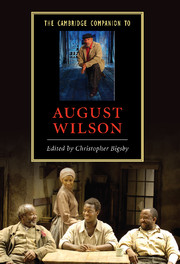Book contents
- Frontmatter
- 1 August Wilson: the ground on which he stood
- 2 Been here and gone
- 3 August Wilson’s relationship to black theatre: community, aesthetics, history and race
- 4 Music and mythology in August Wilson’s plays
- 5 Gem of the Ocean and the redemptive power of history
- 6 Joe Turner’s Come and Gone
- 7 Ma Rainey’s Black Bottom: cutting the historical record, dramatizing a blues CD
- 8 A piano and its history: family and transcending family
- 9 The tragedy of Seven Guitars
- 10 Safe at home?: August Wilson’s Fences
- 11 Two Trains Running: blood on the tracks
- 12 Jitney, folklore and responsibility
- 13 King Hedley II: in the midst of all this death
- 14 Radio Golf: the courage of his convictions - survival, success and spirituality
- 15 Critics on August Wilson
- 16 An interview with August Wilson
- Index
13 - King Hedley II: in the midst of all this death
Published online by Cambridge University Press: 28 January 2008
- Frontmatter
- 1 August Wilson: the ground on which he stood
- 2 Been here and gone
- 3 August Wilson’s relationship to black theatre: community, aesthetics, history and race
- 4 Music and mythology in August Wilson’s plays
- 5 Gem of the Ocean and the redemptive power of history
- 6 Joe Turner’s Come and Gone
- 7 Ma Rainey’s Black Bottom: cutting the historical record, dramatizing a blues CD
- 8 A piano and its history: family and transcending family
- 9 The tragedy of Seven Guitars
- 10 Safe at home?: August Wilson’s Fences
- 11 Two Trains Running: blood on the tracks
- 12 Jitney, folklore and responsibility
- 13 King Hedley II: in the midst of all this death
- 14 Radio Golf: the courage of his convictions - survival, success and spirituality
- 15 Critics on August Wilson
- 16 An interview with August Wilson
- Index
Summary
In African societies, life is closely associated with blood. When blood is shed in making a sacrifice, it means that human or animal life is being given back to God who is in fact the ultimate source of life. Therefore the purpose of such sacrifice must be a very serious one. Such sacrifices may be made when the lives of many people are in danger. The life of one person or animal, or of a few of either, is destroyed in the belief that this will save the life of many people. Thus the destruction of one becomes the protection of many.
Set in the 1980s, August Wilson's King Hedley II (1999) reveals a world in which the lives of many people are in danger. Twenty years after the passage of the Voting Right Act and its accompanying promise of social change, conditions for African Americans in the inner cities are, perhaps, worse than ever. Reaganomics has failed to trickle down, black-on-black crime is at its height, the youth of the community suffer the oppression of crack culture, and, by 1990, the unemployment rate for black men is twice as high as for white. US Department of Justice statistics for the late 1980s reveal that African Americans represented 12 per cent of the population but were responsible for 50 per cent of all homicides and 66 per cent of all robberies; 50 per cent of all urban blacks were arrested for a serious crime at least once in their lifetime. Most of the crimes occurred within dominantly or completely African American communities. The victims were rivals, neighbours, enemies, relatives. The availability of drugs and guns and the distinct lack of opportunities determined the fate of many young men and women whose isolation from community and history made them easy prey. They had lost their cultural connection; Aunt Ester was dead.
- Type
- Chapter
- Information
- The Cambridge Companion to August Wilson , pp. 169 - 182Publisher: Cambridge University PressPrint publication year: 2007

